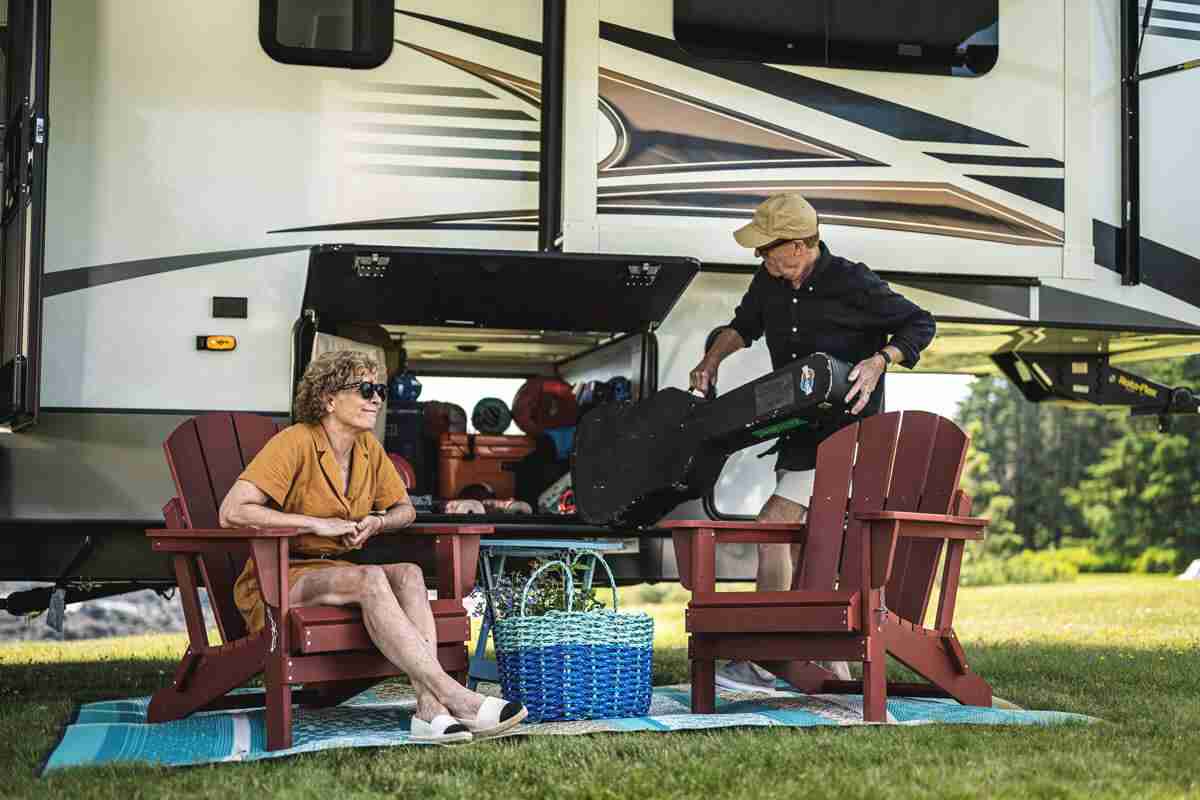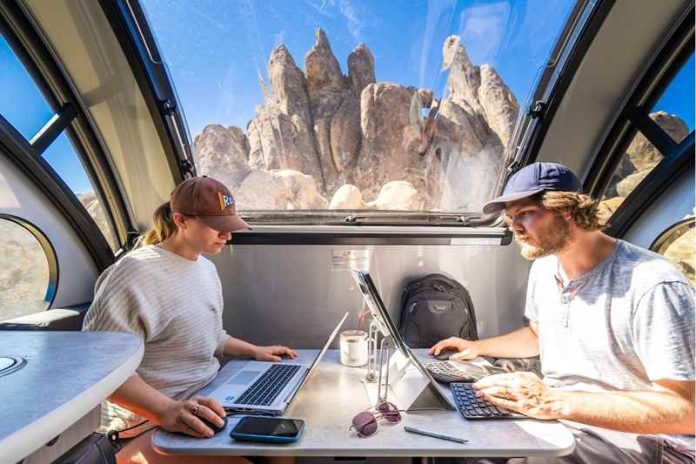Table of Contents
Embracing the RV Lifestyle
Have you ever imagined what it would be like to wake up to a different view outside your window every morning? The RV lifestyle presents just such a possibility, combining the comforts of home with the thrill of the open road. Let’s delve into why so many are drawn to this nomadic way of life.
Exploring the Appeal of the RV Lifestyle
The lure of the RV lifestyle isn’t hard to understand. It’s the siren call of the unexplored and the cherished freedom to roam. For adventurers and free spirits, an RV represents more than a vehicle—it’s a gateway to a life unbound by four static walls. Imagine journeying across the country, visiting national parks, or finding solace in secluded spots—all while bringing along the familiar comforts of home. This kind of lifestyle appeals to those who yearn for variety and spontaneity in their daily lives.

Benefits of Flexibility and Freedom in Remote Work and Workcamping Jobs
The rise of working remotely has been a game-changer for aspiring RVers. With just a laptop and a reliable internet connection, many professionals can now take their work on the road. This flexibility means that you don’t have to choose between earning a living and quenching your thirst for adventure. Workcamping jobs further complement this lifestyle by often providing not just income, but also a place to park and live temporarily. Roles like campground hosting or seasonal maintenance work can immerse you in new communities and experiences, all while supporting your wandering lifestyle.
Understanding the Challenges Associated with a Mobile Lifestyle
While the RV lifestyle brims with excitement, it’s not without its hurdles. Constant travel requires a significant amount of planning and adjustment. There are logistical considerations such as route planning, maintenance of the RV, and managing living spaces efficiently. Additionally, staying connected can be a challenge in remote areas, which is critical for those relying on the internet for working remotely. Adapting to these challenges requires resourcefulness and a willingness to learn from the inevitable bumps on the road.
Remote Work Opportunities
The allure of the RV lifestyle is undeniable, and with the advent of working remotely, this dream is increasingly attainable. The key to success lies in identifying the right job opportunities that allow you to roam freely while maintaining a steady income.
Identifying Remote Work Options Across Various Industries
Working remotely isn’t confined to any single industry. A plethora of sectors have opened their doors to the digital nomad, from technology to education, and from marketing to customer service. Tech-savvy individuals can look into web development, IT support, or software engineering roles. Those with a knack for words might find content creation, copywriting, or translation perfect for life on the road. Educators can teach or tutor online, while administrative professionals could consider virtual assistance or data entry jobs.
Companies are increasingly recognizing the value of remote workers, which has led to a broader acceptance across various job markets. Websites like We Work Remotely, Remote.co, and FlexJobs offer platforms where job seekers can find remote roles tailored to their skills and experience. This ensures that regardless of your professional background, there’s likely a remote job that fits your expertise.
Discussing the Potential for a Work-Life Balance While Working Remotely
One of the greatest benefits of working remotely is the potential for an improved work-life balance. You can take control of your schedule, opting to work during your most productive hours. This flexibility allows you to weave in time for travel, recreation, or simply relaxing with a cup of coffee in front of a scenic view. Moreover, without the need to commute, you save time and can reduce stress, which often translates to increased productivity and job satisfaction.
However, achieving this balance does require discipline. Setting clear boundaries between work and leisure time is essential. It’s easy to fall into the trap of always being ‘on’ when your home is also your workplace. Therefore, establishing a routine and sticking to it is crucial for both productivity and well-being.
Addressing Common Misconceptions About Working Remotely
Despite its growing popularity, some misconceptions about working remotely persist. One such myth is that remote workers are less productive. In reality, studies show that remote employees are often more productive than their office-based counterparts. Without the distractions of a traditional office environment, remote workers can focus better and accomplish tasks more efficiently.
Another common false belief is that working remotely leads to isolation. While working remotely does mean less face-to-face interaction with colleagues, it doesn’t have to be lonely. Digital communication tools like Slack, Zoom, and Microsoft Teams can keep you connected with your team. Additionally, the RV community itself is known for its friendly and supportive nature, offering chances to socialize and network.
Lastly, there’s the idea that remote jobs don’t pay well, which is not necessarily true. Many remote positions offer competitive salaries comparable to in-office roles. Plus, when you factor in the savings from not commuting or needing a professional wardrobe, the financial benefits become even more apparent.
By understanding these misconceptions and knowing the truths behind them, you can better navigate the landscape of working remotely and fully enjoy the perks of the RV lifestyle.
Workcamping Jobs in the RV Lifestyle
Moving from the realm of traditional remote work, let’s delve into a concept that’s unique to the RV lifestyle: workcamping. What exactly does this term mean, and how does it fit into the nomadic life? Imagine merging your living space with opportunities to work in the great outdoors or at various campgrounds across the country. This is what workcamping is all about.
Defining Workcamping and Its Role in the RV Lifestyle
Workcamping combines work with camping, where individuals offer their labor at campgrounds or similar settings in exchange for a place to park their RV and, often, a stipend or salary. It’s a symbiotic relationship: campgrounds gain a reliable workforce, and RVers receive a unique chance to stay and explore new areas without the usual costs associated with lodging. This setup is particularly appealing to those who crave variety in their surroundings and enjoy being close to nature.
Highlighting Popular Workcamping Job Opportunities
- Campground Hosting: Hosts welcome guests, provide information, and sometimes help with event organization.
- Maintenance: Keeping the campground in tip-top shape can involve landscaping, equipment repair, and general upkeep.
- Seasonal Positions: These range from guiding tours to working at nearby attractions, depending on the location and time of year.
Each role offers its own unique perks and experiences, allowing workcampers to find something that aligns with their interests and abilities.
Discussing the Financial and Lifestyle Considerations of Workcamping
Financially, workcamping can significantly reduce living expenses since rent is often covered. However, it’s crucial to assess the compensation package, including any additional salaries or benefits, as these can vary widely. When considering the lifestyle, think about the balance between work hours and personal time. Some positions may require significant commitment during peak seasons, while others might be more laid-back. Also, consider the community aspect; workcampers often form tight-knit groups, sharing tips, stories, and companionship.
By understanding the nuances of workcamping, you can make informed decisions about whether this path aligns with your vision for RV living. It’s not just a job; it’s a way of integrating work and play into a cohesive, adventurous lifestyle.
Creating a Remote Work Routine on the Road
Embarking on an RV journey brings the promise of freedom and adventure, but it also requires a shift in how we approach our work routine. Establishing a productive workspace within the confines of an RV is crucial for success in working remotely. With a few strategic adjustments, the transition from office to mobile workspace can be both smooth and efficient.
Strategies for establishing a productive workspace within an RV
First things first: identifying a dedicated work area is key. Choose a spot within your RV that is comfortable, well-lit, and as free from distractions as possible. Consider ergonomic furniture, like a supportive chair or a desk at the right height, to maintain good posture and comfort during work hours. Organizing this space with necessary supplies and tech gadgets helps in creating a mini-office that is both functional and inviting. Additionally, investing in a reliable internet connection, perhaps through a mobile hotspot or a signal booster, ensures that you stay connected wherever your travels may lead.
Balancing work responsibilities with travel and leisure activities
The allure of the road can often compete with work obligations. To maintain balance, set a clear schedule that delineates work hours from leisure time. By creating and adhering to a routine, you can enjoy the sights and experiences your nomadic lifestyle offers without neglecting professional duties. It’s also beneficial to plan your travel itinerary around your work commitments, so that longer drives or explorations coincide with days off, allowing you to fully immerse in the adventure without the worry of pending tasks.
Tips for managing time zones and maintaining communication with remote teams
Working across different time zones adds another layer of complexity to working remotely. Using digital tools like world clocks and scheduling apps can help you track meetings and deadlines effectively. Clear communication with your team about your availability and time zone differences is essential. Regular updates and check-ins can bridge any gaps caused by geographical distance. Embrace technology for staying in touch; video conferencing and collaborative online tools allow for real-time interaction and teamwork, making distance virtually nonexistent.
By integrating these strategies into your RV lifestyle, you can create a harmonious blend of productivity and exploration. With a designated workspace, a balanced schedule, and effective communication, the world becomes your office—a place where work and wanderlust coexist beautifully.
Navigating the Practicalities of Workcamping
When you’re living the RV life and working on the go, it’s not all about the open road and the freedom it brings. There’s a practical side to consider too, especially when it comes to workcamping. Let’s dive into some of the legal and regulatory considerations that are essential for every workcamper to understand.
Legal and Regulatory Considerations for Workcampers
For starters, it’s important to realize that as a workcamper, you’re essentially entering into a temporary employment agreement. This means it’s crucial to be aware of tax implications which may vary depending on whether you’re classified as an employee or an independent contractor. Keeping track of your income and expenses for tax purposes is a must, and in some cases, you might have to handle your own tax withholding.
Moreover, you’ll need to stay informed about the local labor laws of the states you work in, as they can differ significantly. Be sure to look up minimum wage requirements, overtime rules, and any other relevant regulations. And if you’re traveling between states, remember that each state has its own rules regarding residency and how long you can stay without becoming a resident. This could affect your taxes and access to certain benefits or services.
Ensuring Good Connectivity and Internet Connections
Ensuring good connectivity while living the RV lifestyle is critical, especially for those who rely on the internet to work remotely. An RV mobile internet setup must be robust enough to handle work responsibilities during travel days when traditional Wi-Fi options might not be available. For a comprehensive mobile internet overview, RVers should explore the range of mobile internet options available to them.
This can include satellite internet, cellular data plans with sufficient coverage, and Wi-Fi extenders to enhance existing signals. It’s advisable for RVers to consult a mobile internet resource dedicated to the nomadic community, which can provide insights into the best solutions for mobile internet from an RV. By integrating these resources and tools, RVers can maintain productive work environments, ensuring that even on the move, they stay connected and capable of fulfilling their work obligations without interruption.
Finding Workcamping Opportunities and Securing Positions
Now, let’s talk logistics. Finding the right workcamping gig requires some legwork. Start by researching online job boards and forums dedicated to RVers and workcampers. Websites such as Workamper News and CoolWorks can be goldmines for job listings tailored to the RV community. Remember to read job descriptions thoroughly and reach out to employers with a well-prepared resume and cover letter that highlight your adaptability and willingness to embrace the workcamping lifestyle.
After you’ve landed a position, there’s often more to do before you hit the road. Confirm details like the duration of your stay, the amenities provided, and any work expectations or quotas. It’s also wise to get everything in writing, even if it’s just an email confirmation. This will help avoid misunderstandings and ensure both parties are clear about the arrangement.
The Importance of Community and Networking While Workcamping
Finally, never underestimate the power of community. In the transient world of workcamping, connections can be everything. They lead to job opportunities, provide support, and offer a sense of belonging. Attend RV rallies, join online communities, and participate in campground events to meet fellow workcampers and industry insiders. These encounters can not only lead to future gigs but also enrich your workcamping experience with shared knowledge and camaraderie.
Networking can also mean the difference between a good workcamping experience and a great one. Seasoned workcampers often share tips on the best places to work, how to negotiate agreements, and ways to deal with common challenges on the road. They can also offer advice on how to balance work responsibilities with enjoying the travel lifestyle, connecting the dots back to creating a remote work routine while on the road.
In essence, navigating the practicalities of workcamping is about preparation, understanding the rules, and connecting with others. By addressing these aspects, you set yourself up for a seamless transition between work and adventure, making the most of your RV lifestyle.
Blending Work and Adventure in the RV Lifestyle
Imagine waking up to a different view each morning, your office window showcasing the country’s most stunning landscapes. The RV lifestyle offers this unique blend of work and adventure, but how do you ensure you’re not just living at work on wheels? Let’s explore the potential for unique experiences and exploration while workcamping.
Showcasing the Potential for Unique Experiences and Exploration While Workcamping
Workcamping is not merely about having a job that travels with you; it’s about the promise of new horizons. Each destination comes with its own set of wonders, from local festivals and hiking trails to regional cuisine and cultural landmarks. The beauty lies in the ability to immerse yourself fully in these experiences. For instance, if you’re camped near a national park, your days off can become epic adventures of exploring nature’s masterpieces, while evenings can be spent under starlit skies that city life often obscures.
Indeed, the stories of those who’ve embraced this lifestyle often include serendipitous encounters, like spotting wildlife from their mobile office or joining a community event they stumbled upon during a morning walk. Such spontaneous moments enrich the workcamping experience, underscoring that it’s not just a way to earn but also a way to live fully.
Discussing Strategies for Integrating Work Commitments with Travel Adventures
Striking the right balance between work and wanderlust requires a strategy. Begin by setting clear work hours, even if they’re unconventional, to ensure productivity isn’t sacrificed for spontaneity. Use technology to your advantage; digital calendars and reminders can help you carve out time for both deadlines and downtime.
Moreover, planning travel routes around your work schedule can be beneficial. If there are conference calls on the horizon, perhaps plan to be near a town with reliable internet access. Conversely, save remote wilderness areas for when you can afford to disconnect. Taking control of your work schedule means you can also control your adventure schedule, allowing both aspects of your life to coexist harmoniously.
Encouraging a Balanced Approach to Work and Leisure in the RV Lifestyle
The key to a fulfilling RV lifestyle is balance. While the freedom of the open road is exhilarating, it’s essential to remember that rest is just as important as work and exploration. Deliberately scheduling downtime into your day-to-day life prevents burnout and ensures you have the energy to enjoy your travels to the fullest.
Consider adopting habits that promote well-being, such as morning exercise routines before logging on for work or evening relaxation practices after a day of sightseeing. Also, staying connected with friends and family can keep you grounded, reminding you that despite the ever-changing scenery, the important things remain constant.
In the end, workcamping in the RV lifestyle is about more than survival; it’s about thriving. By consciously integrating work commitments with travel adventures, you create a life that is as productive as it is picturesque. It’s this synergy that can transform the routine into the extraordinary, and turn every destination into both a place of business and a new discovery.
Conclusion and Next Steps
As we draw the curtains on this journey through working remotely and workcamping within the RV lifestyle, let’s take a moment to revisit the treasures we’ve uncovered along the way. Workcamping and remote jobs aren’t just employment options; they’re gateways to a life rich with freedom, flexibility, and the joy of exploration. In closing, remember that your RV is more than a vehicle; it’s a vessel for your aspirations. As long as you steer with intention and equip yourself with the right tools and knowledge, the road ahead is yours to shape.















